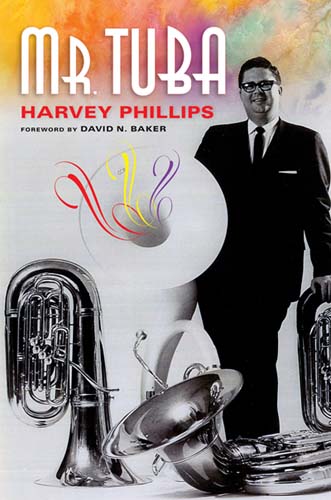
Near the beginning of his autobiography Mr. Tuba, Harvey Phillips compares his life to the story of Johnny Appleseed because his planting of “composition seeds” in the “minds of composers” had resulted in future compositions and opportunities for the tuba (75). The story of Johnny Appleseed is an apt metaphor for the life of Harvey Phillips in multiple ways. First, Phillips was responsible for whole forests of new pieces and opportunities for the tuba (more than 200 commissioned works). Second, the story of Johnny Appleseed is a classic American origin myth, and Phillips, from the outset, clearly puts himself in the category of a self-made American artist. Third, Johnny Appleseed is biography made tall tale, passed on through generations, told differently each time, and Phillips, as this autobiography makes clear, often emphasizes the story more than the art. Finally, Johnny Appleseed is a story of the past, one many young Americans likely wouldn’t even know today. In the same way, the musical life Phillips describes is a narrative of a world and an ideology fading into history.
A good storyteller, like a good composer or jazz soloist, knows how to begin a narrative. The most famous opening line of an American musician autobiography probably belongs to Billie Holliday: "Mom and Pop were just a couple of kids when they got married. He was eighteen, she was sixteen, and I was three.” This opening—moving, rhythmic, ironic, funny, tragic, and improvisatory (it wasn’t actually true)—is classic Billie Holliday and sets up the themes of her life and narrative. The opening sentences of Harvey Phillips, Mr. Tuba also set up themes of a musician who grew up in an America that no longer exists.
“News spread quickly in our small town of Marionville, Missouri. In mid-June 1947, when the preacher of my church heard that I would be ‘running away with the circus,’ he drove to our house and asked to speak with my mother and me.” (1)
In the first short paragraph of the book, there is mention of a small town, a visiting preacher, a protective mother “holding a handkerchief in her lap,” an “old upright piano” and the threat of “running away with the circus (1). From the opening passages of Mr. Tuba, it is clear that it is being framed as an American biography rooted in the past, in an idealized world of black and white Lincolnesque childhoods filled with quintessentially American experiences. Within just a few pages the Americana expands to include a family Civil War legend, the singing of Methodist hymns on the porch, and a depression narrative that lists the chores to be performed at 5:00 AM. Clearly this will be a story of a boy rooted in American history who, through hard work, good morals, and a sense of mild rebellion—he does leave with the circus—will “make good.” Phillips’s story and education are prime material for those interested in studying the Protestant roots of American brass playing.
If this is the kind of childhood not many can remember any more, part of the pleasure for brass players will be reading of a musical education that few can remember either. Phillips—at least in his version of the narrative—honed his skills, not in summer camps or music conservatories but in circus bands, by playing his mother’s favorite hymns, and practicing in cemeteries. While Phillips will move to New York City, study with the best teacher, attend the best music conservatories, and befriend famous composers, musicians, and conductors, he will always remind us that he was a small town Protestant boy who kind of lucked into playing the tuba and who chose playing in the circus over going to college. The idea of experience over formal education is a theme in the book, even as his career turns to his work and teaching at major music conservatories for the last half of his life.
While Phillips’s musical education, where you learn to read music in a circus band, learn to phrase by playing hymns, and play the tuba in a world without solo literature and before brass quintets, is hard for today’s brass musician to imagine, his descriptions of the business of music—the details of which Phillips is also much concerned with—are also radically different than today. Phillips paints a world where it is possible to turn down offers from the Met Opera and the Boston Symphony because the richness and variety of freelance playing was more rewarding. “I don’t want to be in the opera business,” Phillips tells someone, “I want to be stay in the music business” (164). Or as he explains, “I thought I was in musician heaven as a freelance player because there was so much variety, which dissuaded me from putting all my performance eggs in a symphony orchestra or opera basket” (101).
For fans of the tuba, for those interested in the history of American brass playing, or for anyone who wants to feel what the daily life of being a musician was in the mid-twentieth century, this is a valuable book. Mr. Tuba is not a work of literature with the distinctive voices found in the autobiographies of Billie Holliday, Yehudi Menuhin or Miles Davis. Phillips is not a skilled prose stylist, and he tends to tell rather than to show. Sometimes picaresque, sometimes almost stream of consciousness, often chatty, always warm, the book’s pleasures are not so much in reading it cover to cover, or in what it teaches, but rather in dropping in and out—to feel the hour-to-hour movement of being a circus musician in 1947 or a New York freelancer in 1956.
The biggest pleasures of the book and the moments when the writing is the liveliest and most moving are in the depictions of the great musical friendships Phillips had with musician such as William Bell, conductors like Gunther Schuller, and composers like Alec Wilder. Yet, while his joy in being a musician and working with such amazing people constantly comes through, there are many passages that leave the reader wanting more musical details. For example, Phillips mentions an impromptu reading session of his close friend Alec Wilder’s Suite for Horn, Tuba, and Piano that took place in the Fred Mills’ living room with Jon Barros, Gilbert Kalish and Wilder. But instead of showing or telling us what it was like or what was said, Phillips moves on; it seems to be just another day, folded into a rich life of music that might include the Met Opera on Wednesday, a circus on Thursday, and Dizzy Gillespie on Friday. This is certainly part of the point of the book, but wouldn’t it be fun to really hear specific details of what they talked about, what the music making was like?
For better or worse, the book has little thematic organization and is light on musical or cultural analysis; with few exceptions, it progresses chronologically through chapters organized around Phillips’s activities such as playing in the circus, founding and performing with the New York Brass Quintet, or teaching at Indiana University. What it does give is a detailed diary-like glimpse into a musician’s life and a brass player’s world that will soon be as quaint as the scenes that opened the book. To read about Phillips’s experiences in the 1950’s, for example, is to enter into a world that is just barely on the edges of today’s New York freelance experience. There are still a few brass players on the scene that perfected their skills in circus bands instead of college; it was just a few short years ago that one could play next to Don Butterfield on a summer outdoor band concert; and one still meets older low brass players who refer in reverential tones to “Mr. Bell,” but these memories will soon fade from our music culture.
But while Phillips writes of a music world that has largely passed, another of the pleasures in reading this book is in encountering the familiar, the things that never change. One of joys of being a freelance musician still is, of course, the stories that sustain you from one gig to the next. What you often remember about a musical performance is the adventure of getting there, who you sat next to, a practical joke, or a comment someone made. The life of a musician, as Phillips tells it, is as much about card tricks and driving stories as it is about melodies and mouthpieces. Freelance music—American style—is a world built on storytelling and musician banter, the tall tale, if you will, and, in this way, New York in the 1950’s feels a lot like it does now. In one of the best anecdotes, Phillips tells of eating lunch in a Kansas gas station restaurant while on a tour with the New York Brass Quintet. When the attendant answers the insistently ringing pay phone on the wall, it turns out to be Gunther Schuller calling to talk to Phillips about an upcoming project in New York. Schuller—Phillips tells us—knew of the tour route and schedule and had contacted the Kansas State Highway Patrol to ask where they might possibly be eating lunch (172).
The inspiration found in Mr. Tuba and in Harvey Phillips’s life is expressed in ways that are both simple and profound. From Phillips’s start with the King Brothers and Barnum and Bailey circuses, his lessons with William Bell and his days at Julliard, his administrative and teaching positions at the New England Conservatory and Indiana University, and his founding of the New York Brass Quintet and TubaChristmas, to his one brief paragraph about how Parkinson’s disease forced him to retire, the constant theme is one of optimism. Life is good. Music is good. To be a good musician one must learn to live well. This theme continues past his retirement into the last part of the book which avoids turning nostalgic or maudlin. Instead, always the teacher, Phillips devotes it to his practical advice about being a musician and being a tuba player. Phillips, who from the beginning very self-consciously puts himself in the lineage of American brass players from the Sousa band such as Herbert Clarke and Arthur Pryor (82), here chronicles the history of the tuba and the advances it has made in his lifetime. He also outlines his theory of teaching, an approach that is a logical one, rooted in sound fundamentals, knowledge of history and legacy, common sense psychology, and which constantly returns to the idea of being, as he calls it, a “good musical citizen.” In the final paragraph, the book returns to the opening theme of a preacher and the temptations of the circus. But looking back, although Phillips admits his pranks and jokes were “devilish in nature,” he sees his life, not as one of sin, but as one of “joy and privilege” in living a “lifetime of associations with great music” (449). Readers of this book will no doubt agree.
-- Gregory Erickson, New York University



